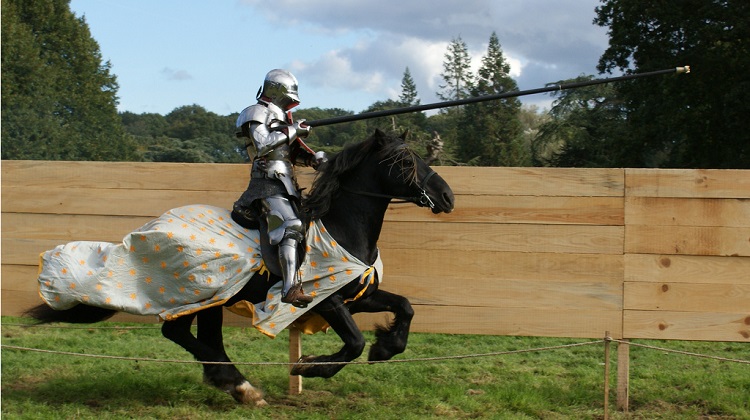By Douglas Galbi

In twelfth-century Europe, did men unquestioningly accept love servitude to women? Today, many men don’t protest men being deprived of all reproductive rights whatsoever. Men say little about acute anti-men gender discrimination in family courts and child custody decisions. Men maintain stoic indifference to being smeared as rapists and being targeted on college campuses for absurd sex regulations. Perhaps men enjoy love servitude to women, relish working as slaves, and cherish being imprisoned. Yet Chrétien de Troyes’s late-twelfth-century Arthurian romance Lancelot hints at a different answer. Men apparently resisted love servitude to women with the same tactics subordinate workers resist orders around the world today.
In Lancelot, a girl rescued the knight Lancelot from his imprisonment atop a tall tower. In popular romance, usually the white knight in shining armor rescues the damsel in distress from imprisonment atop a tall tower. The white knight Lancelot, however, was a manlet. That helps to explain some subsequent events. After the girl rescued Lancelot from the tower, she took him to her favorite retreat, a country house, safe, secluded, and well stocked with provisions. There servants removed Lancelot’s cloths, which were filthy from his languishing in prison. Then:
the girl put him to sleep
In a tall, magnificent bed,
And later gave him a bath
And such wonderful care that I couldn’t
Tell you half if I tried:
She treated him as sweetly
As if he’d been her father.
She brought him back to life,
Completely renewed and restored. [1]
An earlier Latin romance, Apollonius King of Tyre, presented a much different account of a young man-doctor reviving a beautiful young woman. If the girl in Lancelot was receptive and not ugly, a manly knight might have expressed his gratitude to her in a more exciting way. Perhaps she noticed something lacking extension. That would explain why she gave him a bath and treated him as if he were her father.
Urging the girl to rescue him, the manlet Lancelot swore to be her obedient servant. He implicitly promised to be not like other men in servitude to women. Lancelot declared:
I swear I’ll be yours to command
For all the rest of my life
…
there’ll never be a day
When I won’t do what you ask.
Whatever you ask, if it’s in
My power, will be done — and done
as quickly as I can do it. [2]
Most women who order their man-servant (husband, boyfriend, etc.) to do something resent the response “not today.” Lancelot swore that there would never be such a day. Another standard man-servant response is “later.” Lancelot swore that he would obey the woman’s orders “as quickly as I can.” Lancelot, of course, hedged and qualified with words about his potency. Those reservations about potency probably were relevant when the girl gave him a bath.
From the commanding heights of culture, influential institutions and voices teach men to be subordinate to women. But boys aren’t stupid, and men aren’t stupid, either. Overpowered in social communication, men resort to passive resistance. Such passive resistance, however, isn’t sufficient to advance men’s liberation.
* * * * *
Notes:
[1] Chrétien de Troyes, Lancelot ll. 6670-8, from Old French trans. Raffel (1997) p. 210.
[2] Lancelot ll. 6597-8, 6001-5. The ideal of men’s love servitude to women has come to be widely celebrated as courtly love (amour courtois).
Article licensed under a Creative Commons Attribution-ShareAlike 3.0 Unported License.
Feature image by Spencer Wright
Reference:
Raffel, Burton, trans. 1997. Chrétien de Troyes. Lancelot, the knight of the cart. New Haven: Yale University Press.
Reblogged this on Red Pill Nation and commented:
Reblogging this and as always good job